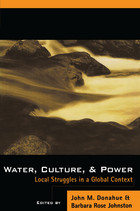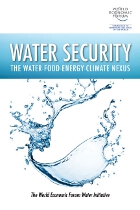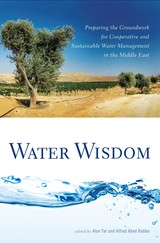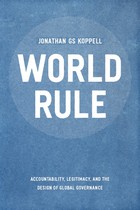4 start with W start with W

According to some estimates, at least 1.7 billion people do not have an adequate supply of drinking water and as many as 40% of the world's population face chronic shortages. Yet water scarcity is more than a matter of terrain, increased population, and climate. It can also be a byproduct or end result of water management, where the building of dams, canals, and complicated delivery systems provide water for some at the cost of others, and result in short-term gains that wreak long-term ecological havoc. Water scarcity can also be a product of the social systems in which we live.
Water, Culture, and Power presents a series of case studies from around the world that examine the complex culture and power dimensions of water resources and water resource management. Chapters describe highly contested and contentious cases that span the continuum of water management concerns from dam construction and hydroelectric power generation to water quality and potable water systems. Sections examine: impact of water resource development on indigenous peoples varied cultural meanings of water and water resources political process of funding and building water resource projects tensions between culture and power as they structure perceptions and experiences of water scarcity, transforming water from natural resource to social constructio.
Case studies include Lummi nation challenges to water rights in the northwest United States; drinking water quality issues in Oaxaca de Juarez, Mexico; the effects of tourism development in the Bay Islands, Honduras; water scarcity on St. Thomas, the Virgin Islands; the role of water in the Arab-Israeli conflict; and other national and regional situations including those from Zimbabwe, Japan, and Bangladesh.
While places and cases vary, all chapters address the values and meanings associated with water and how changes in power result in changes in both meaning and in patterns of use, access, and control. Water, Culture, and Power provides an important look at water conflicts and crises and is essential reading for students, researchers, and anyone interested in the role of cultural factors as they affect the political economy of natural resource use and control.

Directed by UN Secretary General Ban Ki-Moon at the 2008 Davos Annual Meeting, the World Economic Forum assembled the world’s foremost group of public, private, non-governmental-organization and academic experts to examine the water crisis issue from all perspectives. The result of their work is this forecast—a stark, non-technical overview of where we will be by 2025 if we take a business-as-usual approach to (mis)managing our water resources. The findings are shocking. Perhaps equally stunning are the potential solutions and the recommendations that the group presents. All are included in this landmark publication.
Water Security contains compelling commentary from leading decision-makers, past and present. The commentary is supported by analysis from leading academics of how the world economy will be affected if world leaders cannot agree on solutions. The book suggests how business and politics need to manage the energy-food-water-climate axis as leaders negotiate the details of the climate regime that replace Kyoto Protocols.


Dilemmas from climate change to financial meltdowns make it clear that global interconnectedness is the norm in the twenty-first century. As a result, global governance organizations (GGOs)—from the World Trade Organization to the Forest Stewardship Council—have taken on prominent roles in the management of international affairs. These GGOs create and promulgate rules to address a host of pressing problems. But as World Rule reveals, they struggle to meet two challenges: building authority despite limited ability to impose sanctions and maintaining legitimacy while satisfying the demands of key constituencies whose support is essential to a global rulemaking regime.
Through a novel empirical study of twenty-five GGOs, Jonathan GS Koppell provides a clearer picture of the compromises within and the competition among these influential institutions by focusing attention on their organizational design. Analyzing four aspects of GGO organization in depth—representation and administration, the rulemaking process, adherence and enforcement, and interest group participation—Koppell describes variation systemically, identifies patterns, and offers explanations that link GGO design to the fundamental challenge of accountability in global governance.
READERS
Browse our collection.
PUBLISHERS
See BiblioVault's publisher services.
STUDENT SERVICES
Files for college accessibility offices.
UChicago Accessibility Resources
home | accessibility | search | about | contact us
BiblioVault ® 2001 - 2024
The University of Chicago Press









